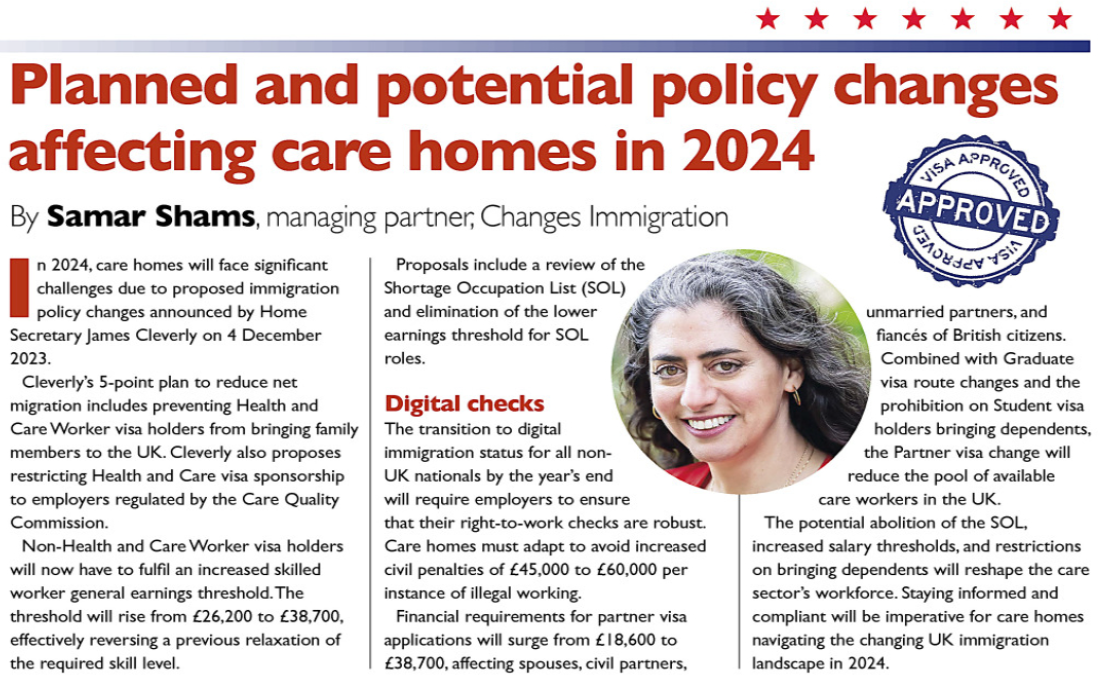Samar Shams, Managing Partner at Changes Immigration, considers how businesses can accommodate sponsorship fee increases whilst ensuring compliance with sponsor duties.
Sponsorship and related visa fees will increase on 4 October 2023.
We have found that sponsors are increasingly seeking to share the financial burden of sponsorship with the sponsored workers themselves. It is possible to do so, but there are some compliance points to consider.
The Home Office revoked the sponsor licences of several sponsors earlier this year on the basis that contractual payback clauses represented debt bondages preventing workers from leaving without paying sums of money they could not afford.
Employers can mitigate the impact of the fee increases without falling foul of Home Office requirements.
What are the new fees?
The visa fee increases are not dramatic: Most fees for permission under the two main sponsored worker categories of Skilled Worker and Senior or Specialist Worker will be 15% higher. The bigger change in costs will come later this year or early next year, when the Immigration Health Surcharge will almost double.
The fees for permission listed here apply to the main applicant and to their dependent partner and children, i.e. each dependant pays the same fee as the main applicant.
Skilled Worker and Senior or Specialist Worker
Application fees from 4 October 2023
| In-Country/Overseas | Fee Category | Current Fee | Fee from 4 Oct 2023 |
| In-Country | Skilled Worker or Global Business Mobility – Senior or Specialist Worker, three years or less | £719 | £827 |
| Overseas | Skilled Worker or Global Business Mobility – Senior or Specialist Worker, three years or less | £625 | £719 |
| In-Country | Skilled Worker or Global Business Mobility – Senior or Specialist Worker, over three years | £1,423 | £1,500 |
| Overseas | Skilled Worker or Global Business Mobility – Senior or Specialist Worker, over three years | £1,235 | £1,420 |
| In-Country or Overseas | Skilled Worker, shortage occupation three years or less | £479 | £551 |
| In-Country or Overseas | Skilled Worker, shortage occupation over three years | £943 | £1,084 |
| In-Country or Overseas | Skilled Worker – Health and Care Visa three years or less | £247 | £284 |
| In-Country or Overseas | Skilled Worker – Health and Care Visa over three years | £479 | £551 |
Certificate of sponsorship and priority fees are similarly increasing.
From 4 October 2023, when a sponsor assigns a certificate of sponsorship to a Skilled Worker or a Senior or Specialist Worker, they will pay a £239 certificate of sponsorship fee rather than the current fee of £199.
The priority service fee, for processing of sponsored workers’ applications within 5 working days, will remain £500 for in-country applications. The fee for priority service for overseas applicants will also be £500, up from the current fee of £250. Processing times are otherwise 8 weeks for in-country applications and 3 weeks for applications made from overseas.
Sharing the burden
As immigration fees have risen over the years, sponsors increasingly ask ‘Who pays this fee, us or the worker?’. The answer is generally ‘It’s up to you’ but take note of certain restrictions.
Restriction 1 – The sponsor must pay the Immigration Skills Charge
The sponsor must bear the cost of the Immigration Skills Charge. The Immigration Skills Charge is £364 per year of visa duration for small companies or £1000 per year of visa duration for large companies, paid as a lump sum when a sponsor assigns a certificate of sponsorship.
The Immigration Skills Charge is the one cost, amongst all those involved in the sponsorship process, that the sponsor is expressly prohibited from passing on to the worker in any way.
Restriction 2 – Any costs born by the worker must not be linked to their salary
Sponsors can agree with a worker that the worker will bear some immigration costs, but any such agreement must be totally separate to the salary.
Sponsors will be familiar with the strict salary requirements that apply when sponsoring non-UK nationals to work. The Home Office wants to be sure that the salary listed on a worker’s certificate of sponsorship reflects their actual salary.
The salary figure listed on the certificate of sponsorship must reflect the basic gross pay. Some allowances can be included for Senior or Specialist Workers. The salary figure on the COS cannot include other costs borne by the employer, e.g. visa costs.
The Home Office considers ‘clawing back’ of visa costs from a sponsored worker’s salary to reduce the basic gross salary. A sponsor seeking to share the burden of visa costs with workers should have a written agreement in place making clear that any costs for which the worker is responsible are not taken from salary payments, either during employment or at termination.
Conclusion
Given the ongoing labour shortages, sponsorship of non-UK nationals will likely remain an attractive option despite fee increases. Employers for whom the rise in immigration costs starts to bite can arrange to share the burden, as long as any agreement clearly reflects that the sponsor continues to meet its responsibilities in respect of salary.
If your organisation needs help in drafting the relevant agreements, please get in touch.
Publication Date: 18 September 2023








